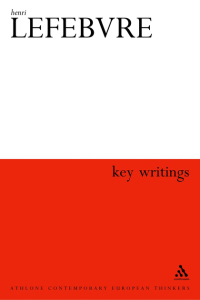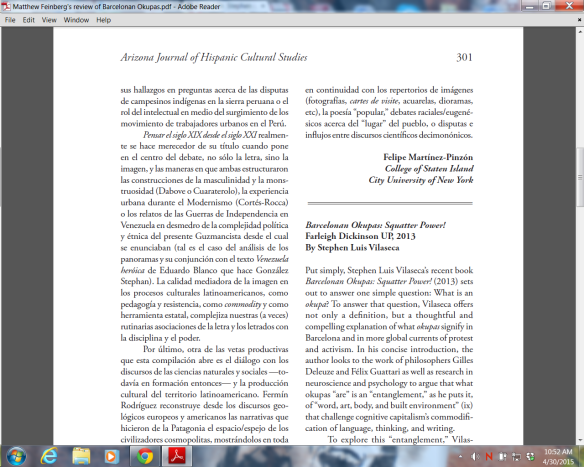 My guide Where to start with reading Henri Lefebvre? has been updated with news of forthcoming translations – Metaphilosophy, Marxist Thought and the City, and the rural essay in Antipode.
My guide Where to start with reading Henri Lefebvre? has been updated with news of forthcoming translations – Metaphilosophy, Marxist Thought and the City, and the rural essay in Antipode.
Monthly Archives: May 2015
Ada Colau and her Model of a City
Source: Ricardo Patriño (2013), cc-by-sa-2.0
Jordi Pérez Colomé, Barcelonan journalist of the Spanish digital newspaper El Español, recently contacted me because he was doing a piece on Ada Colau, founding member of Plataforma de Afectados por la Hipoteca [Platform for People Affected by Mortgages] and candidate for mayor of Barcelona. The elections will be held May 24th, and currently the polls have Colau in the lead. He had a couple of questions for me, mostly about Colau’s past as an okupa (a politically motivated squatter). One of the more pointed questions was about Colau’s political experience. He doubted how much of a model of a city one could have if all one had done in the last ten years was fight for housing rights.
I would argue that housing rights inform how one approaches city development. Colau attacks a predominantly consumption-based strategy of urban growth and design, and redirects the political discourse from the “Barcelona Model” and the image of a showcase city to social justice and the image of a city of and for the people. Colau is opposed to a form of urbanism that cashes in on spectacular architecture as visual commodity to be sold to tourists. Public space, in this type of city development, becomes not a space of true encounter but one of manufactured and controlled interaction safe for tourists and investors. So, the more damaging question would be: How much of a model of a city could one have if one has not fought for housing rights?
The full article can be read here. He cited me with regard to Colau’s involvement with the squatted social center Miles de viviendas. Some newspapers have criticized Colau because of her okupa past. She is called an okupa because it will be perceived as politically damaging by some. To have an okupa past is to have a criminal one. Having said that, the okupas of Miles de viviendas did consciously avoid the okupa aesthetic of a punk in order to move the focus from what an okupa looks like to what an okupa does. Colau is sympathetic to the okupas, but does not share their approach to social, economic and political transformation. She seeks to reform the State whereas the okupas look to foment change outside of institutions.
Wild Ecologies: Speculative Anarchism & Guattari’s ‘The Three Ecologies’
Reading Group #1
Speculative Anarchism?
an·ar·chism (noun): belief in the abolition of all government and the organization of society on a voluntary, cooperative basis without recourse to force or compulsion.
The speculative turn is a phrase that has been used to talk about the way that recent continental philosophy has sought to explode beyond the constraints of endless talk about discourse, language, power-knowledge, textuality, and culture. At the same time the speculative turn also seeks to move passed the frozen obsession with the ‘death of man’ that has, by ceaselessly ensuring that the human, the subject, or Dasein remain the core around which philosophy circles, perpetually enacted a ‘resurrection of man’.
The speculative is about leaving the comfortable waters of human narcissism behind and venturing out once more into the “great outdoors” of objects, material processes, vibrant matter, geological and cosmological time, and thus simultaneously enacting a philosophy that…
View original post 612 more words
Classification Territories and Arts of Resistance in the Urban Space
Author: Aliki Kylika
By 2050 65-75% of the world population will live in cities.[1] As more people are gathered in the urban centres, the urban borders are infinitely expanded transforming the shape of the cities and of the surrounding countryside. In this expansion people are the absolute necessity for the city’s viability, but despite this fact they are not necessarily participant in the design of the urban space. A number of surveys and workshops are claiming to take into consideration the wishes of the local residents in the process of redeveloping each area, but the jargon, the phrasing and the structuring of these surveys raise questions on how much of their content is grasped. The whole process of extracting conclusions from such classification surveys is highly questionable, as it seems that they can easily be manipulated towards the speculations of local authorities and financial investors.
The viability of each urban…
View original post 1,089 more words
Matthew I. Feinberg reviews Barcelonan Okupas: Squatter Power! for the Arizona Journal of Hispanic Cultural Studies
Hispanist Matthew I. Feinberg reviews Barcelonan Okupas: Squatter Power! for the Arizona Journal of Hispanic Cultural Studies (requires subscription).
Dr. Feinberg’s review is complimentary, but more importantly insightful. He identifies in my book the importance of entanglement for the emergent urban body. Okupas, like graffiti and street artists, rehearse what a body is capable of in the material world.
Here’s the first and last paragraph of the review.
Put simply, Stephen Luis Vilaseca’s recent book Barcelonan Okupas: Squatter Power! (2013) sets out to answer one simple question: What is an okupa? To answer that question, Vilaseca offers not only a definition, but a thoughtful and compelling explanation of what okupas signify in Barcelona and in more global currents of protest and activism. In his concise introduction, the author looks to the work of philosophers Gilles Deleuze and Félix Guattari as well as research in neuroscience and psychology to argue that what okupas “are” is an “entanglement,” as he puts it, of “word, art, body, and built environment” (ix) that challenge cognitive capitalism’s commodification of language, thinking, and writing.
Throughout the book, Vilaseca’s work is most compelling when he is able to demonstrate how the textual becomes material and discusses the physical space of the city. It is here in the intermingling of the text and the city where Vilaseca sees okupas as being most impactful, and it is also the place where this author presents his most innovative analytic work. This study is a thoughtful and well-written contribution to the field that not only offers readers a careful analysis of what an okupa “is,” but demonstrates the ways that the embodied activism of okupas are attempting to rewrite the urban experience in Barcelona through the production, sharing, and “comonning”of culture—efforts that seek to use Squatter Power to undermine the rigid social relations produced by the post-fordist city.


